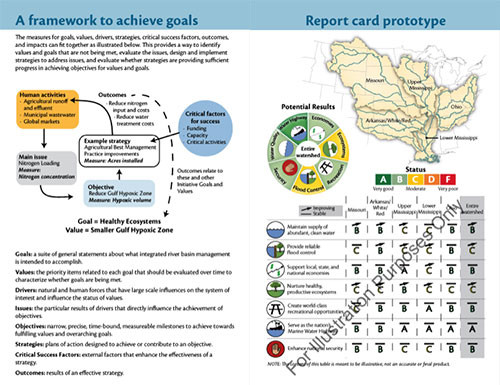Mississippi River Report Card Vision and Framework
Heath Kelsey ·In September, America’s Great Watershed Initiative (AGWI) held a summit in St. Louis, Missouri to develop more coordinated management of the Mississippi River Basin. AGWI is an initiative primarily led by The Nature Conservancy (TNC), although the management of the initiative itself is up for discussion. The summit brought together stakeholders with many perspectives to work on common management, communications, and assessment frameworks for the Mississippi River Basin. The initiative stresses Integrated River Basin Management principles, which aim to account for interests from all stakeholders, including industry, agriculture, transportation, and environment.
IAN has been working with TNC and other AGWI partners to develop a report card assessment framework to integrate information from these interests, broadly grouped into Economic, Societal, and Environment sectors, and seven overall goals. This represents a substantial evolution in report cards that have primarily focused on the environment sector.
In advance of the Summit, we put together a vision for how a Mississippi River Basin Report Card could be developed. The vision illustrated how the framework (Figure 1), and goals (Figure 2) can be used to improve outcomes and assess the overall status of the basin from many perspectives and sectors.

During the summit we had the chance to ask a multidisciplinary group of about 30 participants about what they valued within the context of these goals. Briefly summarized, here are the goals and the things that participants identified with.
Goal: Maintain supply of abundant clean water
People value clean surface and ground water for multiple uses, including drinking, agriculture and industry water supplies, recreation, and ecosystem health.
Goal: Provide reliable flood control
People value protection of life and property through well-maintained flood control infrastructure.
Goal: Support local state and national economies
People value high agricultural, industrial, and energy productivity.
Goal: Nurture Healthy and productive ecosystems
People value protection of abundant and diverse wildlife, ecosystem services (unspecified), reducing the Gulf of Mexico hypoxic zone, and regionally appropriate sediment delivery.
Goal: Create world-class recreation opportunities
People value access to diverse recreational opportunities including hiking, kayaking, boating, etc. People also value the economic benefits of a vibrant tourist economy.
Goal: Serve as the nations marine water highway
People value having safe, secure, and well-maintained navigational infrastructure that has strong ties to rail and highway transport.
Goal: Enhance national security
People value secure water supplies, navigation, and food production.
Next steps for the development of the report card are to engage regional groups with similar aims. There are many groups working at various scales within the basin to improve the management of river resources. These groups could be brought together to develop consistent strategies to improve outcomes and assess status.
About the author
Heath Kelsey

Heath Kelsey has been with IAN since 2009, as a Science Integrator, Program Manager, and as Director since 2019. His work focuses on helping communities become more engaged in socio-environmental decision making. He has over 10-years of experience in stakeholder engagement, environmental and public health assessment, indicator development, and science communication. He has led numerous ecosystem health and socio-environmental health report card projects globally, in Australia, India, the South Pacific, Africa, and throughout the US. Dr. Kelsey received his MSPH (2000) and PhD (2006) from The University of South Carolina Arnold School of Public Health. He is a graduate of St Mary’s College of Maryland (1988). He was also a Peace Corps Volunteer in Papua New Guinea from 1995-1998.

